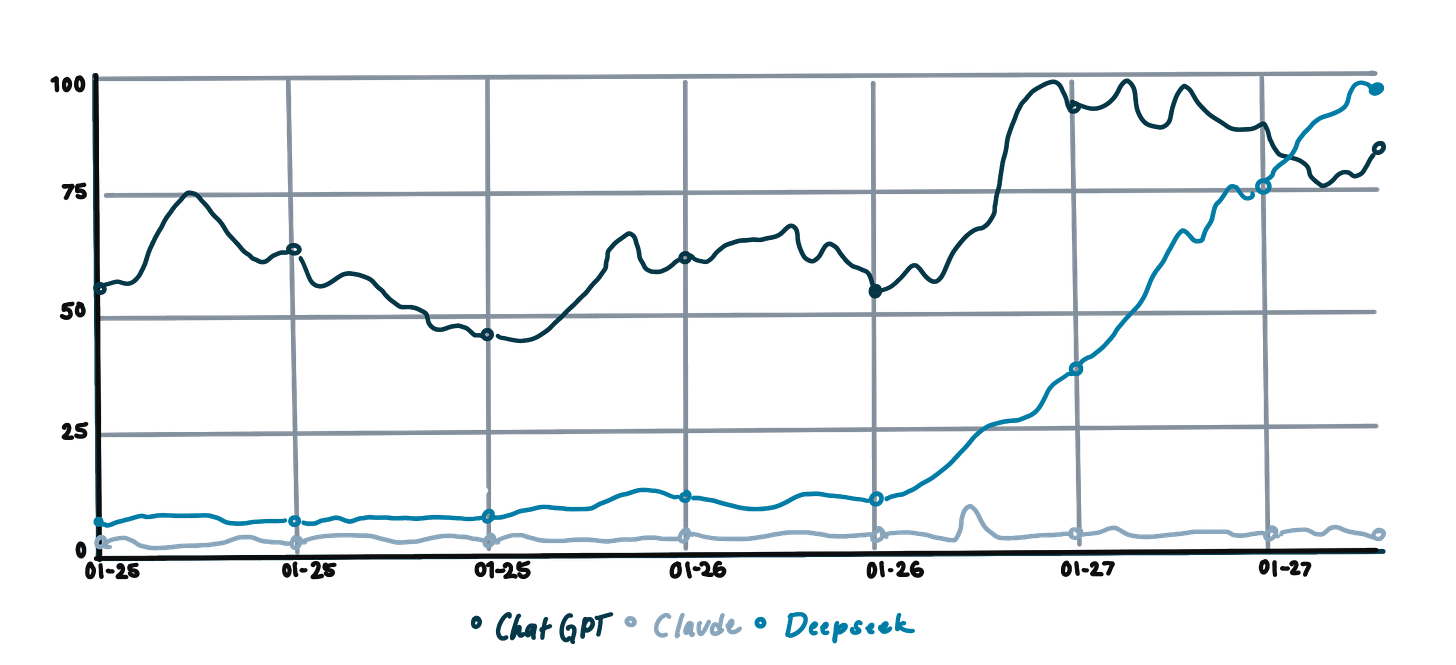China's AI Deepseek Causes US Reset: No More Blank Checks
China Deepseek's $6M AI Triggers Silicon Valley Reset: Market Loses Record $600B in a Day 🥶
Happy Tuesday! It’s Sera, sick in Amsterdam. 😷
It was not my intention to write about this today. It must be said that there are more important things happening in the world, however, since this newsletter is specifically on conscious technology, this is what I’ll focus on. Let’s talk about Deepseek. 👇🏽
Today we’ll cover:
— What is Deepseek R1?
— US Attempt to Restrict China’s Access to Chips Fails
— American Tech Companies Lose Market Value
— OpenAI’s ChatGPT is Overvalued
— Silicon Valley at a Crossroads
— Sustainable Business Models
What is Deepseek R1?
A new player has emerged in AI: Deepseek R1, an open sourced reasoning model. Deepseek entered the scene on January 20th and swiftly claimed the top spot in app store downloads. On January 27th, Deepseek overtook GPT for google searches globally. (Seen below). In my hands-on testing, I found its capabilities remarkably comparable to Claude, my GenAI tool of choice. This aligns with widespread user reports suggesting performance of Deepseek on par with ChatGPT.
Founded in December 2023 by Liang Wenfeng, the tool's impressive capabilities stem from its underlying R1 model. It has 670 billion parameters according to documentation on Hugging Face, an AI dev platform. Principal Researcher at Microsoft says he was suprised by the simplicity, “DeepSeek aimed for accurate answers rather than detailing every logical step, significantly reducing computing time while maintaining a high level of effectiveness.”
Fun facts:
Deepseek has no plans to raise funds.
Code for the model was made open-source under the MIT license.
Requires less compute power and is more energy efficient.
There are six smaller versions of R1 that are small enough to run locally on laptops.
How does it differ from ChatGPT? Like other AI tools developed in China, Deepseek operates within specific constraints. The platform undergoes mandatory review by Chinese internet regulators, resulting in programmed limitations around politically sensitive topics – when asked about Taiwan's autonomy it responded “Let’s talk about something else.” Users should also be aware that the privacy policy is less consumer friendly.
The rise of Deepseek has garnered the attention of technologists, investors, and even the President who commented, this is a “wake-up call” for US companies. The question remains: what makes this development so significant for the tech in the US?
Keep reading with a 7-day free trial
Subscribe to Conscious Tech to keep reading this post and get 7 days of free access to the full post archives.





